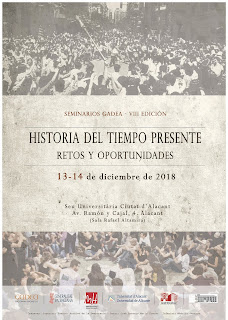VIII Seminario GADEA. Historia del tiempo presente: retos y oportunidades

VIII edición del Seminario GADEA: Historia del tiempo presente: retos y oportunidades Universidad Miguel Hernández de Elche – Universidad de Alicante. (Sala Rafael Altamira, Sede de Alicante de la Universidad de Alicante, Av. Dr. Ramón y Cajal, 4, 03001 Alicante) Retransmisión on line a través del siguiente enlace: https://si.ua.es/es/videostreaming/sede.html 13 diciembre 2018 09:30-10:00 Inauguración del seminario 10:00-11:00 Emmanuel Henry (Université Paris-Dauphine). “Asbestos and its legacy: a revealing example of the links between ignorance, collective action, expertise and public policy 11:00-11:30 Pausa-Café 11:30-12:30 Alfredo Menéndez Navarro (Universidad de Granada). “Un historiador de la salud laboral en la corte del rey Arturo: los retos de la lucha contra el amianto en España” 12:30-13:30 Julio Pérez Serrano (Universidad de Cádiz). “La historia del presente y su contribución al nuevo modo de producción de la historia” 13:30-16:00 Com...
